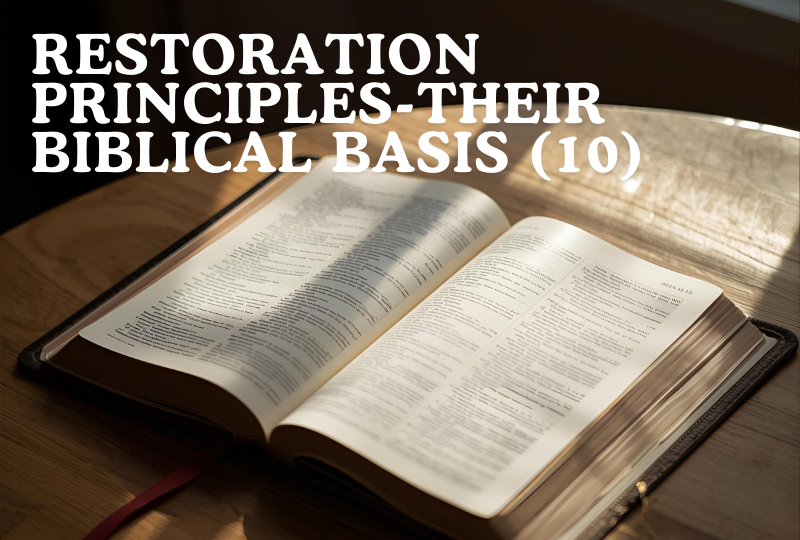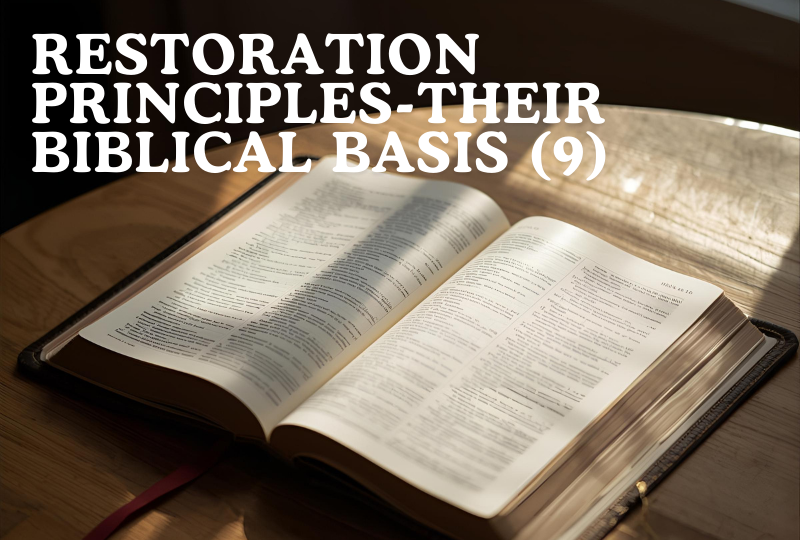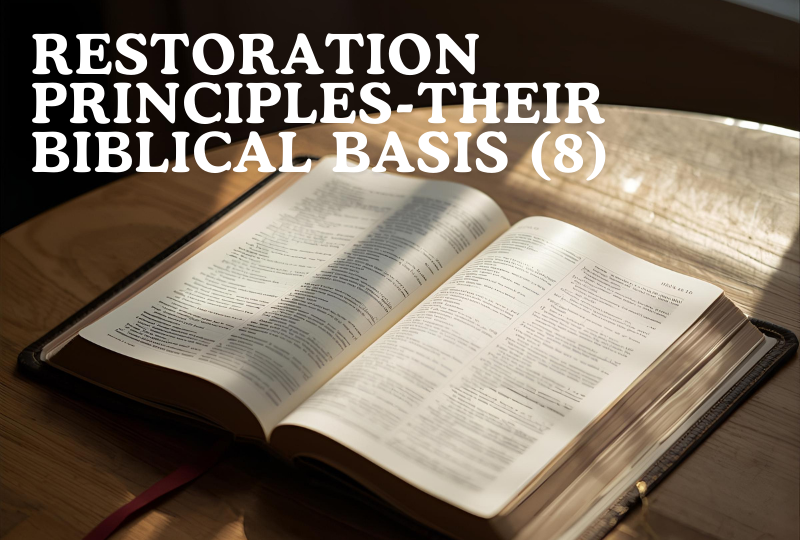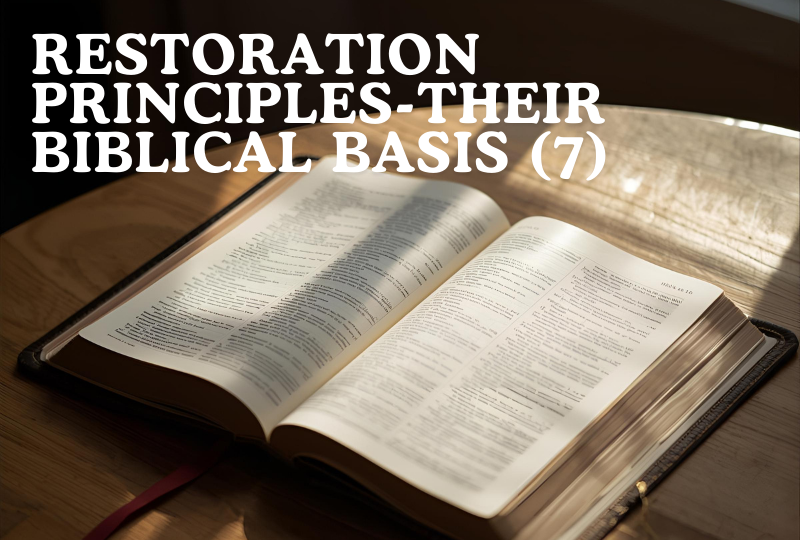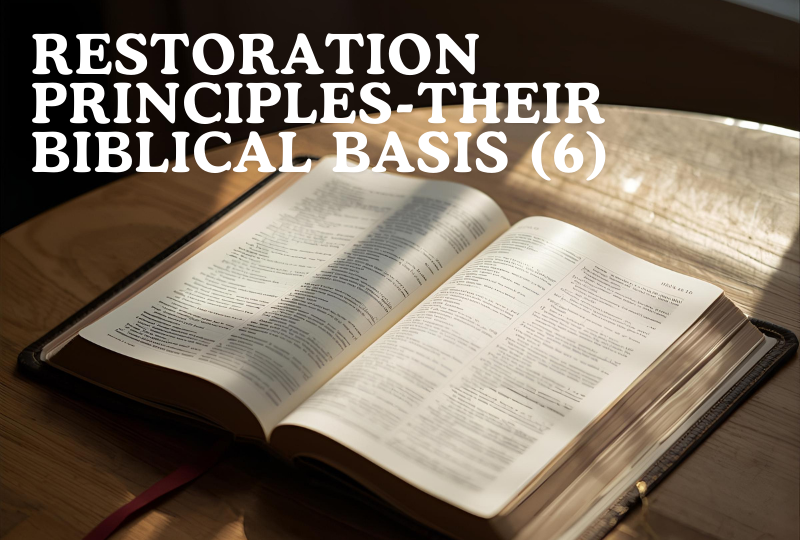Blog
Regular articles and contributions from church brethren for spiritual edification and encouragement.
Although the Law of Moses no longer applies in our Christian Age, having been fulfilled by Jesus' sacrifice on the cross and His subsequent resurrection and ascension (Matthew 5:17-18; Luke 24:44-47). these incidents teach us some important lessons concerning the work of religious restoration in our time.
Restoration work must not leave any aspect of the thing restored unaltered to reflect its original pattern. Whether the item to be restored is a thing (eg. a temple), an act (eg. worship of Deity) or a relationship (eg. between husband and wife), perhaps the hardest to put right is a relationship, particularly when it has to be undone.
The pre-Babylonian exile efforts of King Hezekiah of Judah and his great-grandson, King Josiah, to restore the worship of God as commanded by the Divinely-inspired Law of Moses were not continued beyond their respective reigns partly because they were top-down in implementation.
But, more important than physical restoration of the Jerusalem temple (and the defensive walls of Jerusalem city by Nehemiah the governor later) was the restoring of the mind and heart of the Jews who had returned from the exile in Babylon.
Introduction To Subang Jaya Church's Sunday Sermon Series, 1st Quarter 2026
SUBANG JAYA CHURCH SUNDAY SERMON SERIES January to March 2026
Within only 57 years of the death of King Hezekiah, who restored worship and service to God in Jerusalem according to Moses' law, his great-grandson, Josiah, had to undertake all over again the work of religious restoration in Judah.
The work of restoring service to,- and worship of,- our Father is a seriously difficult task to begin and carry through completion
We call Bible things by Bible names and we do Bible things the Bible way
There would be nothing to restore if the "faith once for all delivered to the saints" (Jude 3)
There would be NO need for restoration if there is no original pattern of belief and conduct to believe and obey to begin with NOR if that original pattern was never meant to be preserved over time NOR if the original pattern had never been adulterated or deviated from.
At the heart of religious restoration is a commitment to return completely to a previous order of things when conditions,- belief, worship and moral conduct,- were correct by God’s standards.
Over the centuries after the Cross that claimed the physical life of Jesus and His resurrection from the dead, the chief scandal of Christianity is that of division and dispute among Bible-believers.
Offsprings are a Divine heritage and reward, whose parents “will not be put to shame” (Psalm 127:3-5), but only if sons and daughters have been chastened (i.e. disciplined) by their parents (Hebrews 12:7-11).
Truth is correspondence with reality and is the opposite of untruth or error. Whether intended to deceive or not, misinformation is untruth and cannot free us from any bondage to the consequences of sin (John 8:31-36).
Preparing Bible lessons and sermons is not difficult because it only requires the proper handling of information readily available from merely one source, God’s word (2 Timothy 2:15; 4:2)
The modern world is “virtual” in particular reference to our ability today to do almost anything without in-person communication. We can “get in touch” via many modes of information technology, reaching one another clearly and in “real time” (across time-zones!) if our internet connection is unhindered
As custodians of the OT scriptures and with the help of other Israelites or Jews (Nehemiah 8:7-8), the priests were educators of the people in the revealed ways and will of God, (Malachi 2:7), until the coming of the Son of God, Who placed His authoritative (Matthew 17:5; Hebrews 1:1-2) stamp confirming the reliability and trustworthiness of the preserved OT scriptures as Divine revelation.
Having made a prima facie case that the New Testament,- especially the four gospels and the Acts of the Apostles,- are a reliable record of historical facts (including facts relating to supernatural phenomena, like miracles), we then located in those reliable scriptures evidence of the claims and miraculous works of Jesus Christ that He was human AND DIVINE. Jesus was “worshiped” (Matthew 28:17), as only Deity or God should be.
In the three recorded instances of the Jews inferring that Jesus was claiming to be God, Jesus could have very easily dispelled their inference by denying He was claiming to be God. If the Jews were wrong to thus infer, it was His custom to correct them unequivocally (eg. Matthew 22:29). Here were three opportunities to declare clearly that He was NOT claiming to be God. However, Jesus did not so declare.
After it has been ascertained that the New Testament is a reliable (i.e. trustworthy) record of eyewitness testimony and reactions to that testimony, we need to determine what it,- especially the four gospels and Acts of the Apostles,- says about the person of Jesus Christ, the focus of its contents. Most importantly, we must determine whether the New Testament records that Jesus was Divine, being Deity or God. Only if He was God would we be able to accept as true what He said about the scriptures of the Old and New Testaments,- that they were God’s word communicated to mankind and thus authoritative for us. After all, only God Himself would know whether any writing were His inspired word.
Up to this point, we have built a prima facie case (i.e. one which is built upon evidence at “face value” and before it is challenged) that, firstly, there exists an all-knowing, all-powerful, all-benevolent God who can communicate with mankind and, secondly, that the New Testament (not yet the entire Bible, including the Old Testament) is a historically trustworthy document.
The Good Book that brother Steven Chan loved, and lived by, tells us that individuals are to be known by their fruits (Matthew 7:18-20).
There’s no reason for anyone to reject the existence of the supernatural beyond our human, material existence.
Critics of the Bible very seldom find fault with the details in it which have to do with people, places and events.
Many elements recorded in the New Testament,- especially names of people and places as well as happenings,- can be verified by comparing with non-scriptural sources which are contemporaneous (i.e. closely related in time) with the scriptural record.
The reliability of a written document subjected to the INTERNAL EVIDENCE Test depends on whether or not it contains eyewitness testimony which has withstood the scrutiny of others, especially disinterested people.
The first step in proving that the contents of the four gospels and the book of Acts contain reliable historical records requires subjecting their available copies of manuscripts to the BIBLIOGRAPHICAL Test.
The case for the Bible’s divine authority moves from science to legal-historical reasoning: if God exists and Jesus is God, then His endorsement of Scripture affirms it as God’s word.
